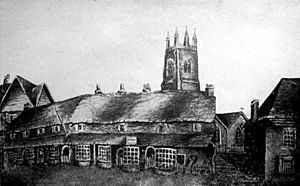Jacobite uprising in Cornwall of 1715 facts for kids
The Jacobite uprising in Cornwall of 1715 was the last time people in Cornwall rose up against the British King. This happened in 1715.
Contents
Why the Uprising Happened
On August 1, 1714, Queen Anne passed away. After her death, George, who was the Elector of Hanover, became the new King. He was a grandson of King James I. This was decided by a law called the Act of Settlement of 1701.
However, James Stuart believed he should be king. He was the son of James II of England, who had been removed from the throne in 1688 during the Glorious Revolution. James Stuart was often called the Old Pretender.
When George I was crowned, many riots broke out across Great Britain. This showed James Stuart that he might have enough support to try and take the throne by force.
Support in Cornwall
The main leaders of the Jacobite uprising in Cornwall were important politicians. These included James Butler, 2nd Duke of Ormonde and Henry St John, 1st Viscount Bolingbroke. Their plan was to capture important cities like Bristol, Exeter, and Plymouth. They hoped that if these big cities were taken, smaller towns would also join their side.
Ormonde trusted a man named Colonel Maclean. Maclean was sent to Devon and Cornwall to meet with important members of the Tory party. He also met others who might support James Stuart. However, it seems Maclean might have been a spy. He may have given the government names of people who supported the Jacobites. This allowed the government to stop their plans.
On September 22, John Anstis, who was a Member of Parliament (MP) for Launceston, was arrested. He was accused of planning an uprising. On October 6, Sir Richard Vyvyan was also arrested. He was an MP for Cornwall and a very important Jacobite leader in the West. He was sent to London.
On October 7, Mr. James Paynter of Trekenning announced that James Stuart was the true King. He did this in the market square at St Columb Major in Cornwall.
At this time, the government's representative in Cornwall was Hugh Boscawen. He quickly called out the local army, known as the militia. His actions stopped any further attempts at an uprising.
James Paynter and his servant, along with another rebel named Henry Darr, ran away to London. They stayed hidden for some time. Paynter's servant was sending letters to his sweetheart in St Columb. The postmaster suspected the letters were from one of the rebels. He checked a letter and found it came from London. Warrants were issued for their arrest. They denied who they were until someone who knew them well was sent from London. Then they were identified.
Later, Paynter and his friends were sent to Newgate Prison. They were to be tried for high treason, which is a very serious crime against the King. Paynter said he was a judge in Cornwall, so he was tried in Launceston. Henry Darr died in prison there.
Eventually, Paynter was found not guilty by a jury that supported the Jacobites. After the rebels were set free, their friends wore white cockades in their hats. This was a Jacobite symbol. They were welcomed with bonfires and balls all the way to Lands End.
Proclamation at St Columb
In October 1716, the names of people linked to the announcement of James III at St Columb were:
- James Paynter, junior
- Thomas Bishop, a gentleman
- Henry Darr, who was a bailiff and innkeeper
- Anthony Hoskin, a pewterer
- Francis Brewer, junior
- Richard Whitford, a barber
- John Angove, a clothier
- Richard Meter, a tailor
According to Henry Jenner, the postmaster who opened the letter from James Paynter's servant was likely Ralph Allen. Ralph Allen later became famous in Bath. He was working at the St Columb post office at that time. His careful work may have been the start of his success.
In Fiction
Some stories have been written about these events in Cornwall.
- Kearsley, Susanna (2011). The Rose Garden. This is a romance story based on Cornwall's part in the Jacobite uprising.
See also
- Cornish Rebellion of 1497
- Second Cornish Uprising of 1497
- Prayer Book Rebellion (1549)
- Monmouth Rebellion (1685)
- Bloody Assizes (1685)
- The Glorious Revolution (1688)
- Sir Jonathan Trelawny, 3rd Baronet (1650–1721), one of the Seven Bishops tried under King James II
- Jacobitism
 | William L. Dawson |
 | W. E. B. Du Bois |
 | Harry Belafonte |


